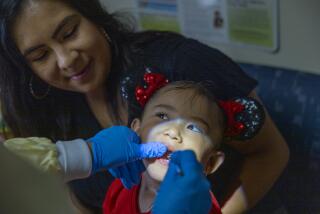Hot Jobs : OCCUPATION: Dental hygienist
- Share via
* What’s involved: Dental hygienists work in conjunction with general dentists and periodontists, cleaning patients’ teeth and educating them about proper oral hygiene. During a routine visit, they inspect the patient’s mouth for cancer and other illnesses, then check tooth decay and gums for inflammation. They take X-rays and assess them to formulate a dental hygiene plan for the patient. They clean and polish the patient’s teeth and occasionally remove inflamed tissue. Hygienists may administer local anesthesia or nitrous oxide under a dentist’s supervision.
* Qualifications: They must complete an accredited dental hygienist program offered at either a four-year university or community college. After completing their studies, hygienists must then take the National Board Examination, an eight-hour written exam. Next comes the state licensing exam, which involves four hours of testing in a clinical setting. The license must be renewed every two years.
* Prospects: One of the 10 fastest-growing job fields in Orange County.
* Outlook: By 1998, the number of dental hygienists is projected to increase by 14.4% to 1,590 positions.
* Salary range: Most hygienists work part time and receive $200-$225 a day.
* Pros: Dental hygienist is a popular profession for those with young children at home, since part-time work lets hygienists earn a good income and have a flexible schedule.
* Cons: Dental hygiene students sometimes discover that they are not comfortable doing work inside people’s mouths. The job also requires constant contact with patients who are anxious and suffering various degrees of pain. A drawback to part-time work is that dental hygienists do not always receive health insurance or retirement plans.
* Advancement: Hygienists may become involved in research or public health education and administration. Some work in sales for dental office equipment companies.
* Quote: “The job requires me to be both an educator and a motivator. We teach people how to take care of their mouths so they can avoid painful and expensive dental work. Not all of them listen, but once you have brought them to a state of health and decreased their pain, they trust you.”-- Ina Rydalch


